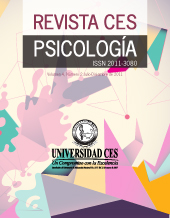Relationship between lifestyle and positive psychological functioning in university administrative staff
DOI:
https://doi.org/10.21615/cesp.5473Palavras-chave:
lifestyle, positive psychological functioning, mental health, administrative personnel, universityResumo
In Mexico, healthy lifestyle has a low prevalence. The importance of a healthy lifestyle lies in avoiding the emergence of a chronic non-communicable disease. Thus, university administrative personnel are a vulnerable population due to working conditions that prevent them from having a healthy lifestyle, so it is necessary to analyze psychological variables that can explain how to promote and develop a healthy lifestyle. The purposes of this study were to identify relationships among lifestyle (LS) and positive psychological functioning (PPF) and their differences by gender in the administrative staff; a cross-sectional and correlational study was conducted. University administrative staff (n = 102), were recruited using the snowball sampling method, forming a non-probabilistic sample, completed the Fantastic Lifestyle Questionnaire and the Positive Psychological Functioning Scale. LS has a statistically significant correlation with PPF (r = .355, p = .001); in addition, it is worth pointing out that showing a low level of PPF implies a lower probability of having a healthy LS (Ψ = 28.333, 4.965 – 161.675). Results suggest the relevance of interventions to develop psychological resources in people seeking the adoption of a healthy LS.
Downloads
Referências
Abraira, V. (2002). Desviación estándar y error estándar. SEMERGEN – Medicina de Familia, 28(11), 621-623. https://doi.org/10.1016/S1138-3593(02)74138-5
Bränström, R. (2013). Frequency of positive states of mind as a moderator of the effects of stress on psychological functioning and perceived health. BMC Psychology, 1(1), 1-7. https://doi.org/10.1186/2050-7283-1-13
Camacho, L. A., Echeverría, S. B., & Reynoso, L. (2010). Estilos de vida y riesgos en la salud de trabajadores universitarios. Journal of Behavior, Health & Social Issues, 2(1), 91-103. https://doi.org/10.22201/fesi.20070780.2010.2.1.20421
Casellas-Grau, A., Vives, J., Font, A., & Ochoa, C. (2016). Positive psychological functioning in breast cancer: An integrative review. The Breast, 27, 136-168. https://doi.org/ 10.1016/j.breast.2016.04.001
Castiblanco, D. S., López, P., López, S. J., Menjura, H., & Forero, V.H. (2016). Estilos de vida en trabajadores de salud. Paper presented at the II Congreso Internacional de Investigación en Ciencias de la Salud, Educación y Música (XI Jornada Corpista de Investigación), Cajicá, Colombia.
Cerecero, P., Hernández, B., Aguirre, D., Valdés, R., & Huitrón, G. (2009). Estilos de vida asociados al riesgo cardiovascular global en trabajadores universitarios del Estado de México. Salud Pública de México, 51(6), 465-473. https://doi.org/10.1590/s0036-36342009000600004
Ferrari, H., Basile, J., & Prescilla, J. (2019). Clima e suporte organizacional: avaliação e relação entre as temáticas. Revista CES Psicología, 12(2), 65-82. http://dx.doi.org/10.21615/cesp.12.2.6
Flórez, L. (2007). Psicología social de la salud: promoción y prevención. El Manual Moderno.
González-Cantero, J. O., Oropeza-Tena, R., Padrós-Blázquez, F., Colunga-Rodríguez, C., Montes-Delgado, R., & González-Becerra, V. H. (2017). Capital psicológico y su relación con el estilo de vida de universitarios mexicanos. Nutrición Hospitalaria, 34(2), 439-443. https://dx.doi.org/10.20960/nh.172
Jiménez, E., Álvarez, A., Reyes, B. L., Casique, L., Herrera, J. M., & Sánchez, M. (2017). Health-promoting lifestyle and assertiveness in university workers. Investigación y Educación en Enfermería, 35(1), 26-34. https://doi.org/10.17533/udea.iee.v35n1a04
Joseph-Shehu, E., & Ncama, B. (2019). Factors Influencing University Staff Health-Promoting Lifestyle Behaviours in Nigeria: A Qualitative Descriptive Study. Global Journal of Health Science, 12(1), 46-59. https://doi.org/10.5539/gjhs.v12n1p46
Joseph-Shehu, E., Ncama, B. P., Irinoye, O., & Sibanda, W. (2019). Assessment of Health-promoting lifestyle behaviour (HPLB) of University workers in Nigeria. Research Journal of Health Sciences, 7(4), 322-333. http://dx.doi.org/10.4314/rejhs.v7i4.7
Kubzansky, L. D., Boehm, J. K., & Segerstrom, S. C. (2015). Positive Psychological Functioning and the Biology of Health. Social and Personality Psychology Compass, 9(12), 645-660. https://doi.org/10.1111/spc3.12224
Lalonde, M. (1996). El concepto de “campo de la salud”: Una perspectiva canadiense. En OPS (Ed.). Promoción de la salud: Una antología. Washington, D. C.: Organización Panamericana de la Salud, Publicación Científica No. 557, pp. 3-5. https://iris.paho.org/bitstream/handle/10665.2/3318/Promocion%20de%20la%20salud%20una%20antologia.pdf?sequence=1&isAllowed=y
Merino, M. D., & Privado, J. (2015). Positive Psychological Functioning. Evidence for a new construct and its measurement. Anales de Psicología, 31(1), 45-54. https://doi.org/10.6018/analesps.31.1.171081
Merino, M. D., Privado, J., & Gracia, Z. (2015). Validación mexicana de la Escala de Funcionamiento Psicológico Positivo. Perspectivas en torno al estudio del bienestar y su medida. Salud Mental, 38(2),109-115. https://doi.org/10.17711/sm.0185-3325.2015.015
Morales, I., Henriquez, S., Fuentes, P., Muñoz, P., Jara, P., Parada, D., & Robledo, P. (2018). Estilo de vida en trabajadores de la Universidad Adventista de Chile. Revista Horizonte Ciencias de la Actividad Física, 9(1), 39-40. http://revistahorizonte.ulagos.cl/index.php/horizonte/article/view/128
Rodríguez, R., López, J. M., Munguía, C., Hernández, J. L., & Martínez, M. (2003). Validez y consistencia del instrumento FANTASTIC para medir estilo de vida en diabéticos. Revista Médica del Instituto Mexicano del Seguro Social, 41(3), 211-220. https://doi.org/10.21840/siic/150140
Rodríguez-Muñoz, A., & Sanz-Vergel, A. I. (2013). Happiness and well-being at work: A special issue introduction. Journal of Work and Organizational Psychology 29(3), 95-97. http://dx.doi.org/10.5093/tr2013a14
Romero, K. A, Salas, M. L., Reinoza, M., García, M., & Moreno, R. (2013). Psicología positiva: un estilo de vida llevado a la educación. Educere, 17(58), 443-453.
Schröer, S., Haupt, J., & Pieper, C. (2014). Evidence-based lifestyle interventions in the workplace—an overview. Occupational Medicine, 64(1), 8-12. https://doi:10.1093/occmed/kqt136
Sharratt, K., Sharratt, M. T., Smith, D. M., Howell, M. J., & Davenport, L. (1984). FANTASTIC Lifestyle Survey of University of Waterloo Employees. Canadian Family Physician, 30, 1869-1872.
Simpson, R., Albert, W., Wilson, D. M. C., Ciliska, D., & Evans C. E. (1984). Lifestyle Assessment: Part 4. The Halton Health Promotion Survey. Canadian Family Physician, 30, 2147-2155.
Uribe, Y. L., Dosman, V. A., Triviño, L. P., Agredo, R. A., Jerez, A. M., & Ramírez-Vélez, R. (2010). Capacidad funcional y calidad de vida relacionada con la salud en trabajadores de una institución universitaria. Revista Ciencias de la Salud, 8(2), 33-43. https://doi.org/10.35537/10915/5429
Velasco-Contreras, M. E. (2013). Perfil de salud de los trabajadores del Instituto Mexicano de Seguro Social. Revista Médica del Instituto Mexicano del Seguro Social, 51(1), 12-25. https://doi.org/10.21840/siic/150140
World Health Organization [WHO]. (2018). Mental health: strengthening our response. https://www.who.int/news-room/fact-sheets/detail/mental-health-strengthening-our-response
Downloads
Publicado
Como Citar
Edição
Seção
Licença
Copyright (c) 2021 CES Psicología

Este trabalho está licenciado sob uma licença Creative Commons Attribution-NonCommercial-ShareAlike 4.0 International License.
Revista CES Psicología ISSN 2011 3080
Facultad de Psicología, Universidad CES Primera edición 2008. Última actualización Mayo 18 de 2022. Todos los derechos reservados. Hecho el depósito legal que exige la ley.
Se autoriza la reproducción total o parcial de los artículos citando la fuente y el autor. This publication may be reproduced by mentioning the source and the authors.
| Métricas do artigo | |
|---|---|
| Vistas abstratas | |
| Visualizações da cozinha | |
| Visualizações de PDF | |
| Visualizações em HTML | |
| Outras visualizações | |




